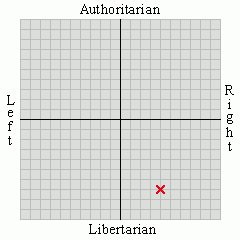While ranting about the London Olympics, the Melbourne Grand Prix, or the money being given to Tiger Woods to persuade him to stop shagging for long enough to hit a few balls around at the Australian Open I've said repeatedly that is not, or at least should not be, a government function
to act as a sports promoter.
Look, I like watching sport. No, in fact I love it and there aren't many things I won't watch (soccer is one of them as it happens). But let's get the principle of the money sorted out once and for all - it is not the job of a government, whether state or federal/national, to act as a fucking sports promoter, okay? It's simply not a government function. By all means talk it up and support it verbally but do not, repeat do fucking not, go putting your sticky fucking mitts into taxpayers pockets to pay for it.
Recently the Melbourne Grand Prix has been in the papers here again, no doubt in part because it's coming up soon and Albert Park has already begun its annual transformation into a racing circuit. Okay, it happens every year because a lot of locals like to use the park for walking the dog or riding their bikes, and from the sports fields and oval there I imagine quite a few clubs and schools use it for cricket, footy, rugby, hockey and soccer, and it goes without saying that they'd quite like the Grand Prix to fuck off. They might not necessarily want it out of the state and would be happy with a move to a purpose built circuit - a revamped Calder Park raceway possibly, or the new circuit proposed for Avalon - but as long as it leaves Albert Park. I have a certain amount of sympathy but it could be argued that their motives are as selfish as those rev-heads who like it being in the city where it's easy to get to.
So instead let us talk money and how much the decision of former Premier Jeff Kennet to bid for the Grand Prix, and those of former Premiers Bracks and Brumby to keep it, have cost the state. Because the main reason it's
in the news again is that the new Premier, Ted Baillieu, along with Melbourne's Lord Mayor, Robert Doyle, have both attacked the event on how much taxpayers' money it eats up.
Premier Ted Baillieu demanded this week that the Australian Grand Prix Corporation, a Victorian government statutory authority, slash the cost of running the race.
... Cr Doyle has queried the long-term worth to Melbourne of the event, which he estimated would cost taxpayers up to $70 million a year by 2015, when Victoria's contract to host the race runs out.
In 2010, the Brumby government spent $49.2 million on the grand prix. In 2006, the event cost $21.2 million. ''I like the event, but we need to look at the cost of the event to taxpayers,'' Cr Doyle said yesterday. ''If we want to have this event after 2015, we are going to have to have a debate about the cost.''
I like the event too, though as a spectator it's not my favourite - none of the street circuits regularly offer racing as entertaining as that seen at Silverstone, which is also noteworthy for not receiving lavish amounts of taxpayer subsidy - but what really offends me is that everyone in Victoria is forced to pay for the fucking thing whether they go or not, and when I or like minded rev-heads choose to buy a ticket we're effectively paying for the second time.
Now although that's wrong any way you want to look at it I do, reluctantly, have to side with Bernie Ecclestone when the unpleasant little prick points out that he has a contract.
Mr Ecclestone, chief executive of the London-based Formula One Group, told 3AW yesterday that the amount of money the Victorian government had to pay to his organisation for the rights to the race could not be re-negotiated.
''Whatever the contract says is what it will be,'' Mr Ecclestone said.
And though I loathe the man both for screwing Victorian taxpayers and for adding more negatives than positives to what was once one of my favourite sports, he's absolutely right - a contract entered into honestly must be kept, even when it's not doing one party any favours. If we lose contracts, if agreements between parties can be rewritten unilaterally by one of them, then we're all fucked.
But saying that is it right that a contract can be signed that affects third parties against their will? I'm not talking about the way governments commit taxpayers to shell out for things they might feel they neither want nor need, or at least not just about that. But here we have Bernie Ecclestone pointing out that he's got a contract with someone who did not sign it and who seems unhappy with the uneven terms he's been committed to by his predecessor, and, since the contract is until 2015, the year
after the next state election is due, might not even be in office when it comes time to renew it. Of course Baillieu's not fucking happy. It's like taking a job only to find out that the previous employee had agreed not to take any breaks or paid holiday and had further agreed that successors would be bound by the same terms.
Now that can't happen in normal life, but because it's a government signing deals it's believed that it's different for some reason. I imagine the parallel would be that a contract may be signed with a company or corporation and still be in force after a boardroom coup which changes everyone involved with signing the deal for a group of people who opposed it. Okay, I see that, but with a company it affects only those who've bought an interest in the company, and that interest should be a motivation to keep an eye on what's going on and rally opposition among other shareholders if need be. Doesn't alway happen that way but if not, tough. With a government it affects everyone whether they like it or not, and the opportunities to oppose moves are limited to protests that may be ignored and elections several years apart. In this way in 2008 the last Premier, John Brumby - who was not even elected Premier by the people of Victoria but was voted in by his own party to replace Steve Bracks, the guy who actually won the election and then resigned less than a year into the term - was able to sign Melbourne and Victoria up for
a further five years beyond 2010, the year in which the Grand Prix contract would have expired.
The Premier John Brumby says Victoria is now committed to the race until 2015.
JOHN BRUMBY: And I am delighted to announce today that the Victorian Government has secured the Australian Formula One Grand Prix in Melbourne for a further five years until 2015.
We have always said of course that this event, that it was a great event for Melbourne.
SIMON LAUDER: The Grand Prix was at risk of being lost, as Formula One manager Bernie Eccleston demanded a night time race, to get more people watching in Europe.
Mr Brumby says the race will begin after 5pm next March.
JOHN BRUMBY: We did hold firm on that. I think there are a lot of people who said if we held firm we would lose the event. We held firm on that and we have retained the event and I think that is probably the biggest win, if you like, for the state.
We have got the race. No artificial light - twilight race if you want to describe it that way. So good for us, good for the event, good for Albert Park and we still get a better starting time throughout Europe.
SIMON LAUDER: Despite the 2007 Grand Prix costing $78-million to run and returning only $43-million, Mr Brumby insists the new five year contract is a bargain.
JOHN BRUMBY: Well, as you know, we don't release the details of the fee which is paid and we are not able to do that for commercial reasons and that has always been the case. What I can say is that in the Government's view, this is a good value for money proposition. We wouldn't sign up if we didn't believe it was.
Arrogant prick! He said similar things about Melbourne's massively overdue and massively over budget public transport smartcard system, only in an even more that's-for-us-to-know-and-not-you tone, and seemed to speak from the heart when he said of the cost of a deal for five new trams that
we didn't need to know.
 |
$50 mill a year and rising for the Grand Prix? Yeah, fuck it.
It's only money and it's not mine anyway. |
Two years later and facing an election he looked like he was going to (and eventually did) lose he'd
changed his tune about the Grand Prix at least:
Premier John Brumby yesterday refused to guarantee the future of the future of the loss making F1 event beyond its 2014 contract.
He admitted the fall in attendances was a worry with only 287,000 spectators at the 2009 race - down 16,000 on the previous year.
Attendances bounced back to around 300,000 over the four-days of racing this year.
But the event cost taxpayers a record $49.2 million - more than double the losses incurred in 2006.
Over the past three years the event has run-up losses of about $130 million.
Mr Brumby said the the Grand Prix contract will be reviewed in the next two years.
Then why sign us up for five more years, you utterly incompetent bell-end? Because at the time you did it you personally could see no downside. You were more than two years from an election and your party probably still had a better popularity rating than the opposition. Two years later maybe you realised you'd bought a lemon, or maybe you could see that the opposition were going to make some political mileage out of it. Maybe you'll concede that renewing the contract along with all the other things your government fucked up, and which Victorians blame you for, ultimately cost you your job. But the point is that even taking that into consideration you've still stuck the next government with the same fucking problem.
So if Ted Baillieu is pissed off about this and also wants to make a mark as Premier I have a suggestion for him. It won't fix the problem for him but it is something radical that will prevent subsequent Premiers from screwing their eventual successors the same way. Victoria
has a constitution setting out the rules of the state government and which can be amended by the Victorian parliament, and have I got an amendment for you, Ted. Make all contracts signed by the government constitutionally limited to a maximum of four years or two years beyond the date of the next election, whichever comes first, unless approved by a referendum. This prevents a government from cursing the one after it with the need to abide by shitty contracts that it can't change for the whole term or possibly even longer. At the worst this would mean a half term of being stuck with a poor deal, though a new government committed to ending it would be able to prepare to do so long before that, and while electorates still remembered who'd signed the thing in the first place. But it would still allow medium term contracts of 2-3 years to be agreed late in a parliamentary term, which should be a motivator for the contractor to provide something of value in order to maximise their chances of seeing it renewed by the next government. And if something really, really has to be agreed for a longer term there's still a mechanism to allow for it - simply agree pending a referendum and put it to the voters themselves. If it costs them nothing then I imagine that relatively few would bother to oppose it and just maybe if Brumby had had to abide by this simple condition he might still have been able to a five year Grand Prix deal, perhaps even for the night race that Bernie Ecclestone wanted rather than the late afternoon time they eventually agreed. But it might have been necessary to move it to a new venue and to reduce or eliminate the public subsidy in order to get the votes.
So what do you say, Ted? I'm no fan of your party, considering them anything but the dictionary definition of 'liberal', but I do feel a little sorry for you with these problems you've been bequeathed by Know-It-All Brumby and his gang. Like Cameramong in London you've inherited a poisoned chalice, though his is far more toxic by the looks of it.* They can be a big, deep trap come the next election, but they can be an opportunity for further electoral success if handled well. Fall into it and we all fall in with you, and we won't be fucking grateful. But if you point out the trap in a very loud voice, remind everyone of when it was dug and by whom, and then board the bastard over so that nobody can fall into it ever again, then the trap can work for you instead.
And come election time, Ted, that could be the difference between one term and two.
*
The same applies in the UK, though I doubt Cameramong has the brains or balls for this, and as I said he's got far bigger problems than Ted Baillieu. But what if he used this year to pass laws that would prevent all future abuses of the kind that that Labour used to dig the sewage strewn minefield in which the British government now stands, and then called an election? Yes, he'd probably need to reach a deal with the LibDem colleagues because they'd agreed to go the full five years, but the obvious thing to suggest to them is to allow all sitting Lib MPs to stand unopposed by the Tories and vice versa unless the candidates agree otherwise (maybe even throw an extra bone and offer not to stand in one or two where the Libs might beat Labour if they had the Tory votes too). But what if he did? Both the Cobbleition parties are already starting to get it in the neck, and it's largely because the country was in such a state that they couldn't breathe without being instantly unpopular with someone. They've got a little, a very little, amount of time left before people forget that the underlying fault was Labour's. The trap is there and it's a deep bastard. If they're dumb enough to hope that a way across will suddenly appear they're likely to end up falling straight into it. If they're clever nobody will fall in, but the bastards who dug it will be left screaming impotently far behind them.



























